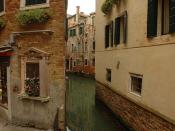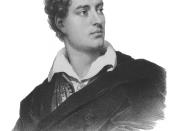On the 25th of April, 1816, a small packet boat drifted silently away from Dover's cliffs - dusky in the dim light - carrying England's most celebrated and notorious Romantic poet, Lord George Gordon Byron. His mood was sullen: having suffered under much derision and scandalous rumours, having failed in his marriage to Annabella Millbanke, having risen suddenly to fame only to become ostracised from gentile society, he was placing himself in voluntary exile from his country to which he would never return.
He would soon find himself in Italy, spending much of his life between 1816 and 1820 in Venice, which had 'always been', for Byron, 'the greenest island of my imagination'. Venice would become Byron's greatest muse - the liberty, experiences, excesses and sensations of Venice would inspire some of his strongest poetical works. It would also see him sink into a life of carnality, immorality and decay.
Despite this, it must be said that Venice matured Byron, both as a writer and as a man - and his eventual relationship with Teresa Guiccioli would secure his transition into middle age, leading him to a more resolute social conscience and a subsequent involvement in liberal Italian and Greek political struggles, in the midst of which he would die of a fever.
This essay shall trace Byron's life in Italy, examining his movements, activities, affairs and poetry of those years. It shall also touch upon what the figure of Byron meant for the Italians, discussing their reactions to Byron's poetry and to the Byronic myth which pervaded Italy long after his death. Firstly, however, it is important to consider the myth Byron himself would have carried concerning Venice so that we can ascertain why he might have chosen to venture there.
Venice was an important city to the...


